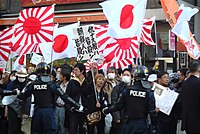
Back Zaitokukai Esperanto Zaitokukai French Zaitokukai ID 在日特権を許さない市民の会 Japanese 재일 특권을 용납하지 않는 시민 모임 Korean Zaitokukai Portuguese Zaitokukai SC 在特會 Chinese
| Zaitokukai | |
|---|---|
| 在日特権を許さない市民の会 | |
 A demonstration by Zaitokukai against Koreans in Japan took place in Tokyo in 2013. A woman carries a placard written "Kill all Koreans". | |
| Leader | Yasuhiro Yagi |
| Dates of operation | 2007[1]–present |
| Active regions | Japan |
| Ideology | |
| Political position | Far-right |
| Major actions | |
| Status | Designated as a potential threat to law and order by the Japanese government due to their "extreme nationalist and xenophobic" ideology.[3] |
| Part of a series on |
| Koreans in Japan |
|---|

Zaitokukai, full name Zainichi Tokken o Yurusanai Shimin no Kai (在日特権を許さない市民の会, lit. 'Association of Citizens against the Special Privileges of the Zainichi'), is an ultra-nationalist and far-right extremist political organization in Japan, which calls for an end to state welfare and alleged privileges afforded to Zainichi Koreans.[3] It has been described by the National Police Agency as a potential threat to public order due to its "extreme nationalist and xenophobic" ideology.[3]
Its membership is between 9,000[4] to over 15,000.[citation needed] Vice News called them "J-racism's hottest new upstarts" in 2014.[5] The group is considered by critics to be an anti-Korean extremist hate group,[6][7] and have been compared to neo-Nazis.[8]
It was founded and led by a man who goes by the assumed name of Makoto Sakurai. On November 16, 2014, Yasuhiro Yagi was selected as chairman for the fifth term as the result of a vote of confidence by the group's members.[citation needed]
Sharon Yoon and Yuki Asahina argue that Zaitokukai quickly succeeded in framing Korean minorities as undeserving recipients of Japanese welfare benefits. Even as Zaitokukai declined, far-right anti-Korean discourse powerfully influences public fears.[9]
- ^ Makoto Sakurai, Daikenkanjidai (大嫌韓時代), Seirindo, 2014, p. 162.
- ^ Julia Trzcińska, ed. (2018). Polish K-Pop Fandom: Phenomenon, Structure & Communication. Stowarzyszenie Badaczy Popkultury i Edukacji Popkulturowej Trickster. p. 79.
- ^ a b c McCurry, Justin (4 December 2014). "Police in Japan place anti-Zainichi Korean extremist group Zaitokukai on watchlist". The Guardian. Archived from the original on 2017-09-02. Retrieved 3 June 2017.
- ^ Cite error: The named reference
NYTwas invoked but never defined (see the help page). - ^ Punk, Olie (24 March 2014). "Japan's 'Internet Nationalists' Really Hate Koreans". Vice News. Vice Media. Retrieved 3 June 2017.
The post was recruiting activists for a counter protest against a right-wing group called Zaitokukai, J-racism's hottest new upstarts.
- ^ Quigley, J. T. (8 October 2013). "Japanese Court Rules Against Anti-Korean Hate Group". The Diplomat. Archived from the original on 2017-08-19. Retrieved 3 June 2017.
- ^ "Rise of Hate Speech in Japan". Asia-Pacific Human Rights Information Center (in Japanese). Archived from the original on 2016-08-01. Retrieved 2016-08-08.
- ^ Fackler, Martin (August 28, 2010). "A New Wave of Dissent in Japan Is Openly and Loudly Anti-Foreign". The New York Times. Archived from the original on 2014-12-17. Retrieved 28 August 2010.
Though some here compare these groups to neo-Nazis, sociologists say that they are different because they lack an aggressive ideology of racial supremacy. There have been no reports of injuries, or violence beyond pushing and shouting. Rather, the Net right's main purpose seems to be venting frustration, both about Japan's diminished stature and in their own personal economic difficulties.
- ^ Sharon J. Yoon, and Yuki Asahina, "The Rise and Fall of Japan's New Far Right: How Anti-Korean Discourses Went Mainstream." Politics & Society 49.3 (2021): 363-402 online[dead link].doi:10.1177/00323292211033072.